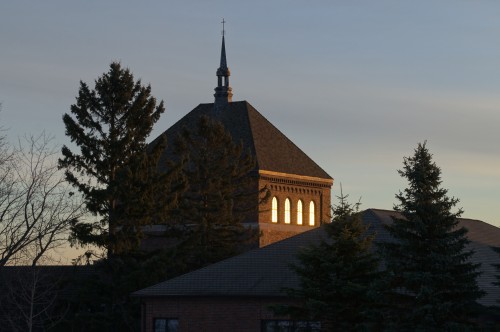
This January is the last month of the Year of Consecrated Life, which began on the First Sunday of Advent in 2014 and ends February 2 with a World Day of Consecrated Life. As this Year began, Pope Francis wrote an Apostolic Letter to religious men and women. In it he encouraged us to look to our past with gratitude, live in the present with passion, and embrace our future with hope. He quoted Saint Pope John Paul II in Vita Consecrata: “You have not only a glorious history to remember and to recount, but also a great history still to be accomplished! Look to the future, where the Spirit is sending you in order to do even greater things.” We must ask ourselves what the people of God need today to live in holiness and peace, in harmony with God’s will and each other.
To celebrate the end of this Year, the Sisters of St. Scholastica Monastery will join with the faculty, staff and students of The College of St. Scholastica to host a 24 hour prayer service in Our Lady Queen of Peace Chapel. It is an opportunity for you to experience many kinds of prayer, some of which may be new to you. People of all faith walks are welcome, and the Chapel will remain open for prayer throughout the night. Praying when all is still and the world is asleep brings unexpected vision to the tired mind. As the stream of thought slows to a stop the voice of God speaks quietly in the heart. In the middle of the night we keep vigil with all who are unable to rest because of illness or pain or worry. Night is a holy time for prayer.
We will begin at 5:15 p.m. on Saturday, January 30 with Evening Prayer and Exposition of the Blessed Sacrament, followed by 24 hours of adoration. The 24 hours of prayer ends on Sunday, January 31 with Evening Prayer at 5:00 p.m. We hope to see you there, or if you are unable to travel you may pray as the Spirit moves you, joining all our prayers throughout the dark night.
Here is the complete schedule, along with some useful websites for some of the ways of praying, so that those who cannot be there in body can join us in spirit and prayer.
Saturday January 30
5:15 p.m. Evening Prayer with the Sisters http://www.universalis.com/readings.htm
6:00 p.m. Exposition of the Blessed Sacrament followed by 24 hours of Adoration
7:30 p.m. Taizé Prayer Service led by Campus Ministry
https://www.youtube.com/watch?v=TQZgOLSiVjY
10:00 p.m. Acoustic Praise with local musicians
Sunday, January 31
10:00 a.m. Morning Prayer with the Sisters http://www.universalis.com/readings.htm
11:00 a.m. Holy Eucharist (the Blessed Sacrament will be reposed during Eucharist)
http://www.universalis.com/mass.htm
2:30 p.m. Guided Lectio Divina (prayer and meditation with Scripture)
http://www.ignatianspirituality.com/ignatian-prayer/the-what-how-why-of-prayer/praying-with-scripture
http://www.contemplativeoutreach.org/category/category/lectio-divina
4:00 p.m. Rosary https://www.youtube.com/watch?v=6e3fkgLT30c
4:45 p.m. Benediction Service
5:00 p.m. Evening Prayer with the Sisters http://www.universalis.com/readings.htm
What does it mean to live a consecrated life? The list includes priests, deacons, brothers, nuns, sisters, hermits, consecrated virgins and widows, and members of Secular Institutes and Societies of Apostolic Life — and perhaps others I have missed. The name covers a wide range of pathways to God, but all have at their heart the vows of poverty, chastity and obedience.
Voluntary poverty means to live lightly on this earth, consuming only necessary resources, doing without, and sharing with those who have less and need more. Poverty liberates us from bondage to money, status, wealth, things. It removes us from the treadmill of working too many hours at high-stress jobs so that we can afford to buy, house and care for all our stuff. (I never realized how much I owned and how little I really needed until I gave it almost all away to come to the monastery.) Living in poverty means we stop seeking happiness through ownership. Instead we lift our eyes higher and find it in loving God, nurturing our relationships with each other and with God, and ministering to others with a joyful heart. Poverty makes us good stewards of time, because we don’t fritter it away in meaningless activity. Nor are we stingy with the hours in our day, for we are given Time in trust to build relationships with others and meet their needs.
Chastity is not just for monks and nuns, nor does it always mean abstaining from sexual relations, for a married couple lives chastely when they commit themselves to each other, love each other to their fullest, and serve the Lord together. For religious men and women, chastity means that our strongest, deepest, most satisfying relationship is with God. Chastity centers us, drives our life and fills us with purpose and joy and the knowledge we are loved dearly. It calls us out of self-absorption and the pursuit of pleasure so that we develop healthy and caring relationships with other men and women. We give others the same kind of love we give God.
Obedience to God means listening to the still, silent voice speaking in our heart, and following God’s will selflessly. It means living in mutual obedience with others where the communal life, shared and nourished by all, becomes more important than individual desires. By obedience we nurture this relationship with God and the other, until one day we will find our own will has become a mirror of God’s. Look at a holy person who is consumed with love for God, and you will see the face of Christ shining out.
Why are there many different religious orders? Because there are many ways of knowing God, and many needs of Church and humanity that cry out for relief. All religious orders begin with an individual who has a personal charism – a special gift from the Holy Spirit – and is inspired to live out the Gospel in a new way. Others gather around him, and the new community grows and spreads to other lands and peoples. It is like a seed, planted and nourished by faith, with roots planted deeply in the Gosptel, that grows to become a great tree with many branches that shelters the earth.
For Benedictines, the visionaries were St. Benedict and his sister St. Scholastica. They saw the world through the lens of faith and learned how to respond creatively to the needs of Italians in the 6th century. Others joined them and over the centuries the order spread in waves throughout Europe and finally to the Americas, Asia, and Australia. Benedictine monastics of each age have created new ways to live their original charism of community life centered on God. We journey together to God, supporting each other in our shared life of prayer, study, work and holy leisure. Around the world, we have ministered to God’s people in ways that would surprise and delight Benedict and Scholastica.

